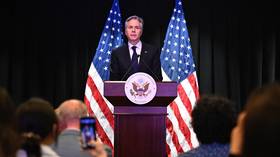Blinken in Beijing: The US tried to turn China against Russia – but did it work?

Antony Blinken traveled to China this week to warn Beijing about sanctions for supplying military technology to Russia, according to the Financial Times and Bloomberg in their previews of the US secretary of state’s visit.
They didn’t specify which sanctions might follow, although FT sources suggested that financial and other institutions in China could face restrictions. Meanwhile, the Izvestia newspaper has revealed that several Chinese banks, including the largest, ICBC, are already not accepting payments in yuan from Russia, for fear of secondary sanctions. Almost 80% of payments to China have been returned, the newspaper claimed.
Washington is apparently convinced that China’s support for the Russian defense industry, although not publicized, is genuine and that this is having a significant impact on the course of the Ukraine conflict.
Even with all this in mind, it was hard to imagine that Blinken would communicate in the language of threats and ultimatums. The first experience of this type of rhetoric between the administration of US President Joe Biden and the Chinese showed that hard and fast pressure does not work with the current leadership in Beijing.
In fact, it has the opposite effect. Proof of this was the failed meeting in Alaska in March 2021, when Blinken and National Security adviser Jake Sullivan tried to pressure their Chinese counterparts, only to be met with a harsh rebuke – and a public one at that – which was a far cry from the spirit of Beijing’s traditionally restrained diplomacy.
Blinken subsequently adopted a much more subtle game. He likely tried to drive a wedge between Moscow and Beijing by exploiting the fact that China’s peace initiatives to resolve the Ukraine conflict do not match the maximalist demands of Russian officials (at least in public).
That may not have worked, considering that the Chinese openly stated on Friday that NATO was responsible for the Ukraine crisis.
Beijing is calling for a cessation of hostilities, in effect a freezing of the conflict, but has made no mention of Ukraine’s demilitarization, denazification,or regime change in Kiev.
Recently, there have been signals that could be interpreted as a willingness by Beijing to distance itself from Moscow.
Specifically, an article in The Economist by Feng Yujun, a professor at Peking University, has caused a stir. This methodical, official expert on Russia and the Ukraine conflict speaks very much in the spirit of Western political thought: he criticizes Moscow, predicts its defeat, praises Kiev for its “strength and unity of its resistance,” and even suggests that if Russia doesn’t change its power structure, it will continue to threaten international security by provoking wars.
Knowing how Chinese society is organized, it’s hard to imagine that the professor who penned this article was acting at his own risk without the support of responsible comrades in Beijing. The recent refusal of four major Chinese banks to accept payments from Russia, even in yuan, can also be seen as an alarming signal to Moscow. In other words, it may turn out that the Russian-Chinese alliance, so strong in words, is far from being effective and trouble-free in practice. And Blinken would certainly have tried to consolidate this trend.
There is a problem, however: the overall context of US-China relations doesn’t make it any easier for Washington.
The package of military aid to Taiwan recently passed by the US Congress certainly doesn’t create a favorable emotional background for the delicate negotiations that Blinken tried to conduct in Beijing. Washington’s efforts to create anti-Chinese military and political alliances in the region – from the Philippines to Australia, from India and Vietnam to Japan – also aren’t conducive to mutual understanding between the two superpowers. American strategists make no secret of the fact that the main, most dangerous and most principled geopolitical opponent of the United States is not Russia, but China.
If that’s the case, what’s the point of Beijing meeting Washington’s demands and joining its pressure on Moscow? Only so that later, when the US achieves its goals in Russia, Beijing will have to confront it alone? This is hardly in the plans of Comrade Xi and his team.
This article was first published by Kommersant, translated and edited by the RT team













